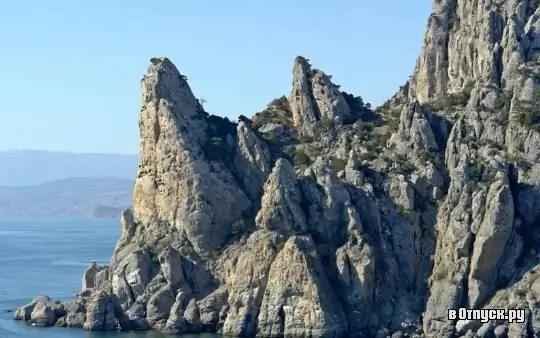
Description of the attraction
On the coast of the Black Sea, not far from Sudak, one of the geological wonders of the world is located - Mount Karaul-Oba. Almost the entire southern Crimean coast is perfectly visible from its magnificent peaks, and the mountain itself is a storehouse of many ancient secrets.
In ancient times, the mountain was a huge coral reef, its height reaches 341 meters above sea level. In the 2nd century BC, the Taurus lived here - the first known inhabitants of the Crimea. And today you can see a monument of their ancient culture: the remains of settlements, utility and residential premises, fragments of unique ancient ceramics. In the most unexpected and unusual places of the mountain, there are the so-called "Taurus Ladders", carved in rocky corridors. Subsequently, one of these stairs was renovated by Prince Lev Sergeevich Golitsyn, who was in love with these places.
If you look into the historical past of the legendary mountain, then on its steep western slopes you can see not only a reminder of the ancient Taurus, but also the remains of the most ancient fortification of King Asander, who built here in the 1st century BC. one of the outposts of the Bosporus kingdom - the Athenion fortress. This fortress controlled the surrounding lands from enemy penetration from the sea and guarded the Bosporus-Chersonesos trade route. The fortress is located on the western slope above the Kutlak Bay. Karaul-Oba got its name from one of the watchtowers of the fortress, which was located on the highest point of the cliff.
In addition to ancient settlements, the mountain is replete with other attractions. Here you can see the famous stone chair carved into the rock, in which Prince Golitsyn loved to sit, watching the magnificent panorama of the entire coast: from Mount Ayu-Dag to Cape Karadag. From here, there is a stunning view of the New World amphitheater and its striking bays with clear, blue water. Under the mountain itself there are amazing natural boundaries - the "Adam's bed" entwined with ivy, behind which there is a wild "Hell" and a cozy "Paradise", described in the poems of N. V. Lezin.






